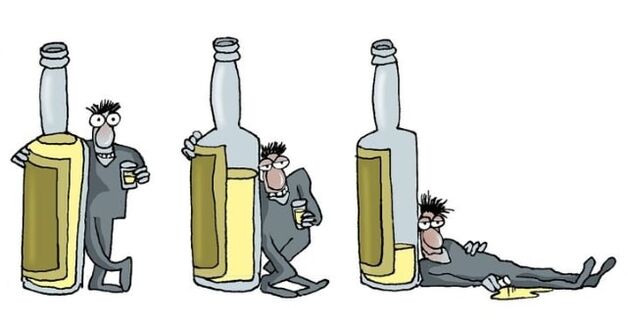According to statistics, men are twice as likely to suffer from alcohol dependence. Our society considers the regular consumption of alcoholic beverages to be completely normal, despite the fact that the consequences of men’s alcoholism are very deplorable for both him and his family.
This opinion is, of course, catastrophic and needs to be reconsidered. Alcoholism is a serious disease that destroys a person’s psyche and overall health. It requires a comprehensive medical approach. As practice shows, even beer leads to stable alcoholism. With it, this disease begins, and later a person switched to strong alcohol.
External signs of alcoholism
The addiction develops and develops gradually, step by step. The presence and development of alcoholism can be recognized by a number of characteristic signs of alcoholism in men. Psychologists and narcologists have developed the main symptoms that can be used to recognize novice alcoholism:
- irresistible craving for alcohol, one seeks the strangest reasons to justify one’s desire to drink;
- aggression against family members, friends, co-workers;
- lethargy and fatigue;
- speech disorders;
- disorders of the musculoskeletal system;
- acquaintance with strangers;
- apathy, mood swings;
- deterioration of general health.
These are the first signs of novice alcoholism that can last up to 10 years. At this stage, it is easy to miss them as often. She just doesn't pay attention to them. He thinks a man is relieving stress after work, trying to escape problems with a can of beer or a glass of brandy. Meanwhile, the disease does not stop and continues to progress.
Causes of male alcoholism
The problem of male alcoholism is dictated by the difference between the psychology of women and men. The man is no less adapting to changing external circumstances and resorting to alcohol to divert his attention from the problems and concerns he faces. In addition, men often resist the persuasion to go for rehabilitation, believing they are able to cope alone.
But this is not the case - in addition to physical dependence, alcoholism brings profound personality changes from the first months of abuse. The external environment often consists of the same alcoholics over time, which also prevents recovery.
Every second family in Hungary will face the problem of alcoholism in the future or has already faced it. This affects all family members without exception, especially children. In general, the causes of addiction can be divided into three types:
- social;
- psychological;
- physiological.
They may appear separately or in combination. Social reasons include the presence of drinking lovers in the environment. Social status plays a special role as people with good jobs and higher education are less likely to face the problem of addiction. It is especially necessary to highlight the presence of stress at work, the level of well-being.
The psychological factors are:
- mental imbalance;
- insufficient level of self-control;
- poor motivation for professional and intellectual development;
- presence of complexes;
- little self-confidence.
There are several other factors that can lead to alcoholism in a man. Only the most common are listed here.
Another group of factors that cause constant intoxication - physiological factors. These are metabolic disorders that lead to the rapid development of addiction and hereditary factors. If there have been cases of alcoholism in previous generations, they are likely to be relevant to later descendants. One thinks that one will not be addicted and can easily give up alcohol at any time. A similar phenomenon is characteristic of alcoholics at all stages of alcoholism.
The alcoholic can be recognized by his eyes and eyes. Ethanol has a negative effect on the eyes, it will be "glassy" and tired. Over time, bags and swellings under the eyes appear. Such a person seems tired. This indirectly indicates the presence of diseases of the internal organs.
A person who drinks constantly often has the smell of alcohol "smoke, " which is hard to confuse with others. People trapped in alcoholism usually do not take care of their hygiene, appearance, and do not hesitate to wear wrinkled and dirty clothes.
Stages and signs of alcoholism
In men, alcoholism has several stages. There are only three coming in a row. The later treatment begins, the more difficult it is to achieve success - psychological dependence and an antisocial lifestyle hinder the progress of treatment.

Signs of the first stage
In the early stages of the development of alcoholism, there is a gradual increase in the amount of drunk alcohol. There are various reasons for this, such a person starts looking for any reason for the drink. However, he gets drunk more and more often every time. Relatives can hear excuses for this behavior:
- I want to rest.
- Others drank more than I did.
- Yes, I drink a lot, but I’m not an alcoholic.
- I’m just tired at work and want to relax.
If these terms are accompanied by aggression, this is a clear sign of the development of addiction. This section is also characterized by other signs related to physiology:
- no gag reflex;
- more and more are needed to achieve the same level of poisoning;
- there are power outages.
All of these manifestations cause a deterioration in overall health, a deterioration in attention concentration, and a decrease in effectiveness. They appear more often during the transition to the next stage.
At this stage, you should already start treating alcoholism in a man - the earlier you are at this stage, the more likely you are to have a successful outcome. In the first stage, the drunkenness is completely healed and the body returns to its original state after recovery, as the organs did not have much time to suffer and their functions were not very impaired.
One cannot imagine life without alcohol. This is how you spend all your free time. This can cause problems in the workplace because an employee who often arrives from a hangover works worse. As a result, conflicts begin with colleagues and management. There are also many problems in family life.
Signs of the second stage
In the second stage of male alcoholism, other characteristic signs appear. Withdrawal symptoms or a hangover are more pronounced here. It consists of nausea and headache. There may be power outages. Sleep and digestion are often disturbed. The craving for alcohol is already irresistible. The alcoholic in the second stage is no longer able to give up drinking. He is the top priority around which all life revolves.
In addition, this stage of the disease is characterized by mental disorders - alcoholic psychoses. This manifests itself in an unstable emotional state, frequent manifestations of aggression, inappropriate behavior, and unwarranted irritability.
Signs of the third stage
This is the last stage of alcoholism. At this stage, the patient should be hospitalized urgently to save his life. There will be a complete decline in personality and moral values will be indifferent. The main goal of an alcoholic is to get a new dose of alcohol and to do anything about it, including breaking the law. This also happens:
- poisoning comes from small doses;
- a hangover is very difficult;
- sleep depends on the amount of drunk, as does eating.
According to medical statistics, the average life expectancy of an alcoholic at this stage does not exceed five years. Continuous intoxication of the body may cause the following symptoms:
- mental decline;
- loss of speech or severe disturbances in it;
- high risk of stroke, heart attack, paralysis, severe liver and kidney failure.

When these symptoms begin to appear, you need to understand that addiction will only increase. The basis for effective and successful treatment is the desire to get rid of the patient’s addiction. Complicating the situation is that alcoholics are often drunk and unable to make informed decisions. This makes it very difficult to have a dialogue with such a person.
The alcoholism of beer should be noted separately. Now this problem is gaining more and more weight in society. In general, many people are convinced that beer should not cause alcoholism. Narcologists are of a different opinion on this issue - frequent consumption of beer can cause persistent alcoholism. He manifests himself in the need to constantly drink this drink and in large quantities. The amount of drunk is gradually increasing. In this case, too, it is worth alerting and starting the rehabilitation process to get rid of this addiction.
Consequences of alcoholism in men
No matter how strong the body is, the consequences of alcoholism in a man will not last long. They can be conditionally divided into two types - psychological and physiological. The latter can manifest itself in disorders of various body systems:
- Male impotence. Under the influence of alcohol, the hormonal background changes and the production of testosterone is interrupted.
- Digestive problems. It can be gastritis, intestinal ulcer, gastric disease.
- Pressure problems. Alcohol destroys the vascular system.
- Pathology of the liver. Frequent alcohol consumption leads to cirrhosis and liver cancer.
- Weak immunity. The body loses its protective properties, common infectious diseases occur.
- Heart problems. Alcoholics are more likely to have heart attacks than non-drinkers.
Alcoholism also affects the human psyche. These violations may manifest themselves in strange behavior:
- Feeling of persecution. One seems to be watching.
- Appearance of hallucinations. Under the influence of alcohol, the brain can create visual, auditory illusions.
- Encephalopathy. It is linked to poor blood circulation and poor nutrition in brain cells.
If such symptoms occur, consult a competent psychologist working with alcoholics immediately. It is important to know that you can start treating alcoholism in a man at any stage.
Recovery steps
- 1st step. Contact a specialist clinic
- Step 2. Convincing the addict to treatment
- Step 3: Detoxification (cleansing the body of toxins)
- Step 4. Comprehensive rehabilitation in an inpatient center
Only in a rehabilitation center will they help a man not only alleviate physiological dependence, but also bring him or her a full recovery through inpatient treatment and accompany the first steps in life after rehabilitation.
Of course, the sooner the qualified help of narcologists is provided, the faster and easier the process of getting rid of the disease will continue. Therefore, if you have the slightest suspicion, consult a specialist immediately.
























